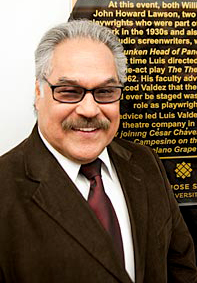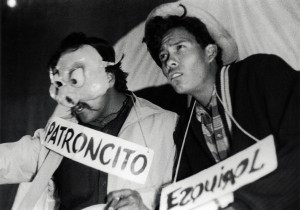 The Hungry Mouth of Creativity
The Hungry Mouth of Creativity
By Cathleen Miller
His theatrical career began because his dad’s truck wouldn’t start.
Luis Valdez’s father was packing up the family, who would be taking down their tent and moving on after they’d finished picking cotton in the San Joaquin Valley. Instead, they watched as all the other migrant workers left for the next location. While Mr. Valdez figured out how to repair the truck, Luis’s mother decided to send her six-year-old son to the local school in Stratford. Each day he took his fish taco lunch in a paper sack and, as instructed, carefully brought the sack back home to reuse the next day. One day the sack was missing from the classroom shelf, and he asked his teacher if she knew what had happened to it.
The teacher explained that she had torn it up. She led the frightened boy into a room and showed him something magical that would change his life: she was using his lunch sack to make a paper mache mask of a monkey. “Why are you doing this?” he asked.
He had attended Stratford for only 30 days, but by the time this conversation was over several important things had happened: first, Luis had discovered the arts; second, he had learned that his first-grade class was putting on a play; and third, Luis agreed to star in this production as the monkey, wearing the mask made from his lunch sack.
He eagerly anticipated his moment of glory when the play would premiere in the old school’s auditorium on the coming Saturday, with the band playing and the community watching. On Tuesday, however, he learned his family had been evicted from the labor camp and would be leaving town the next day to look for work.
 Luis remembers driving away in the fog, brokenhearted at leaving school and missing his theatrical debut. “During that moment a hole opened up in my chest which never closed, and I have poured into it my plays and stories. It became the hungry mouth of my creativity.”
Luis remembers driving away in the fog, brokenhearted at leaving school and missing his theatrical debut. “During that moment a hole opened up in my chest which never closed, and I have poured into it my plays and stories. It became the hungry mouth of my creativity.”
His family of migrant workers remained on the move, but whether they were living in a tent or a barn, they always carried with them the complete set of Encyclopædia Britannica his father had purchased. Neither parent had received the opportunity for much formal education, but they encouraged their children to read.
When Mr. Valdez found steady work tending to orchards, the family was able to settle down in East San José. Later Luis graduated from James Lick High and then pursued his dream of attending San José State. He landed a scholarship for math and physics, planning to follow his older brother in becoming an engineer.
In the mornings he’d walk over to meet his cohorts at Winchell’s Donuts on Fifth St. before all of them headed to their 7:30 class. He took a short cut through Hugh Gillis Hall, and soon he was peeking around backstage. The flickerings of his early dramatic career—and its painful demise—surfaced. “I decided I can’t deny this part of myself—I have to give it a try.” During Luis’s sophomore year at SJSU he changed his major to English with a playwriting emphasis.
Fifty years later a plaque on the SJSU campus reads: “This site is a landmark in the history of Chicano/Latino theatre.”
In the Hal Todd Theatre, Luis Valdez, 1965 San Jose State graduate and world famous playwright and Father of Chicano Theatre in the United States, directed his first full-length play, The Shrunken Head of Pancho Villa, on January 14-15, 1965. At the suggestion of Dr. Harold Crain, Department Chair and mentor, Luis became a playwright-director, which led him to create his company, El Teatro Campesino* (The Farmworkers Theatre). Founded in 1965 on the Delano Grape Strike picket lines of Cesar Chavez’s United Farm Workers Union, the company created and performed “actos” or short skits on flatbed trucks and in union halls inspired by the lives of their audience. Luis Valdez went on to write and direct successes such as Zoot Suit and La Bamba, becoming the first Latino to present a play on Broadway.
The College of Humanities and the Arts is proud to have such a distinguished alum and artist as Luis Valdez. His life is an artistic and humanitarian inspiration for all.
Please see our feature stories on El Teatro Campesino and Zoot Suit for more information.


